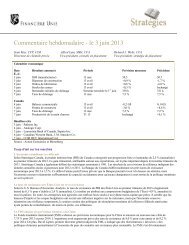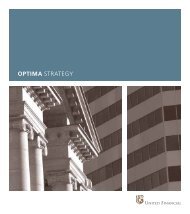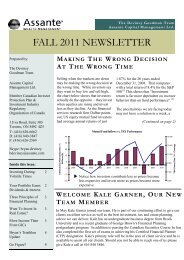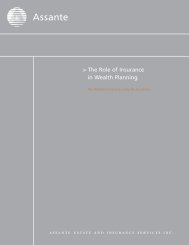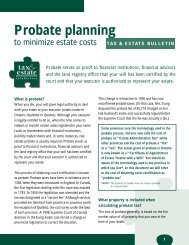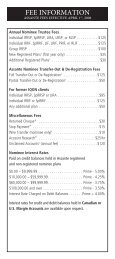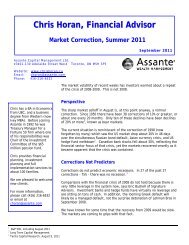Family Law & Estate Planning - Assante Wealth Management
Family Law & Estate Planning - Assante Wealth Management
Family Law & Estate Planning - Assante Wealth Management
Create successful ePaper yourself
Turn your PDF publications into a flip-book with our unique Google optimized e-Paper software.
HOW DOES IT WORK UNDER QUEBEC CIVIL CODE?<br />
Regardless of which spouse is the registered owner<br />
of family assets, the principal and vacation homes<br />
of the family, furniture used by the family in the<br />
homes, motor vehicles used by the family, and<br />
retirement plan benefits accumulated during<br />
marriage form the family property that is divisible<br />
upon death. This is called the family patrimony.<br />
Shares held in private or public companies, bank<br />
accounts and term deposits do not form part of<br />
the family patrimony.<br />
Upon your death, the net value of all assets (market<br />
value less costs to acquire, improve or maintain)<br />
is roughly divided in half. Your surviving spouse is<br />
entitled to one-half of the family patrimony, even<br />
if your will says otherwise (e.g. totally excludes<br />
your spouse or bequeaths the entire value of the<br />
family patrimony to that spouse). The claim of<br />
your surviving spouse has priority over any of<br />
your other beneficiaries or heirs and this could<br />
reduce the amount of their inheritances.<br />
Division of inherited assets –<br />
what you should know<br />
If you are planning your will, or if you are the beneficiary<br />
under the will of someone else, it’s important that you<br />
understand how matrimonial property laws treat<br />
inheritances. Provincial variations in the laws can include:<br />
• Whether or not timing, (whether an inheritance is<br />
received either before or after the beginning of the<br />
conjugal relationship) is a deciding factor in sharing<br />
the inheritance<br />
• Whether or not the inheritance includes the<br />
matrimonial home<br />
• The extent to which other assets acquired with<br />
the proceeds of the inheritance must be shared<br />
• Whether or not the matrimonial property rules divide<br />
or exclude the assets or only the value of those assets<br />
• Whether or not the increase in value of the inheritance<br />
from the time of receipt until the end of the relationship<br />
must be divided<br />
Don’t forget support of dependants<br />
Since 1900, there has been dependant’s relief legislation in<br />
place that permits your dependants to ask for support from<br />
your estate. Provinces vary on the definition of dependant,<br />
so talk to your lawyer to make sure you are clear about this<br />
point. Ontario’s Succession <strong>Law</strong> Reform Act, for example,<br />
sets out a clear definition of a dependant, including a<br />
married spouse, common-law or same-sex partner who<br />
lived with you in a conjugal relationship for at least three<br />
years (or for less than that time if you and your partner<br />
together are the natural or adoptive parents of a child).<br />
Dependant’s relief legislation is intended to prevent a person<br />
from having to claim public assistance as a result of your<br />
death if you were, or should have been, supporting him or<br />
her at the time of death. Because of this, some provinces<br />
have legislation that makes certain assets available to satisfy<br />
a dependant’s relief claim, even if those assets would not<br />
otherwise form part of your estate. In Ontario, for example,<br />
a life insurance policy on which there is a designated<br />
beneficiary does not usually form part of your estate and<br />
is so protected from creditors. However, if there is a claim<br />
for dependant’s relief, the province’s Succession <strong>Law</strong> Reform<br />
Act expressly includes insurance proceeds of an individual<br />
insurance policy owned by you or a group insurance policy<br />
of which you were a member as part of your estate. RRSP<br />
and RRIF accounts owned by you may also be included for<br />
dependant’s relief claims, even if you have named a<br />
beneficiary on the plans.<br />
4



